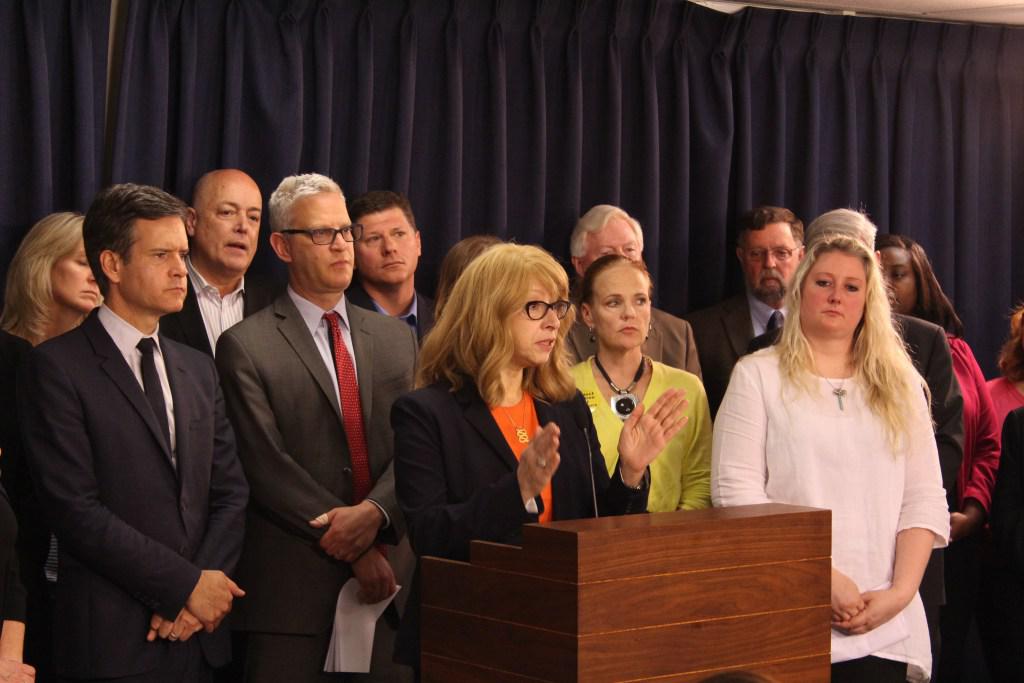|
Child sex abuse victims want governor to renew his commitment to justice
By Kaleb H. Smith
As the session enters its final weeks, child sex abuse victims are calling out the governor and Senate Republicans for not expanding their legal rights to hold their abusers accountable. Sen. Brad Hoylman’s Child Victims Act, and related legislation, would extend the statute of limitations on legal actions for sex crimes against a minor, allowing abuse victims more time to prepare and file lawsuits against their attackers. Victims and their advocates say the governor has forgotten them, and they accuse Senate Republicans — who have blocked the bill for years — of acting like hypocrites. “The Senate Republicans seem to love to talk about domestic violence and sexual abuse and put out 10 different kinds of bills every other week about how to protect those victims,” said Assemblywoman Linda Rosenthal, a Manhattan Democrat. “However the grown-up victims, no one cares about. They think they’ll just go away. But we are here to say we are not going away. We will never go away until justice is done and we pass this bill into law.” Rosenthal sponsors a bill similar to, but not the same as, Hoylman’s “The governor has said that this is one of his issues. He said this in January. I’m going to say that we are depending upon him to bring this bill to fruition,” said Rosenthal. Legislators and advocates are asking Cuomo to stand with them and change the statute of limitations before the end of the session. Under current law, abuse victims have until age 23 to file a lawsuit against their attacker. But studies show, and victims testify, that it often takes years for the abused to sort out what happened to them and then prepare emotionally to address their attackers. Cuomo included plans for addressing the legal rights of child sex abuse victims in his 2017 policy book. His legislative plans for the session included eliminating statutes of limitation for all sexually-related criminal cases when committed against a person who is less than 18 years of age. He also wanted to extend the statute of limitations for civil claims from 3 years from the victims 18th birthday to 50 years from the date of the offense. This would give many victims the opportunity to “have their day in court,” according to his policy book. For any victim who is still unable to bring a lawsuit, the governor would open a one-year window in which these victims are able to commence their claims. Finally, Cuomo’s plans included eliminating the need to file a notice of claim with a public entity before being able to bring a lawsuit against that entity. Under New York law, victims are required to file notices of claim before they file a lawsuit against a public entity. The Governor’s Office said these notices are barriers to the proper administration of justice and should not prevent a victim from having access to the courts. But child victim advocates are telling reporters they fear Cuomo is no longer prioritizing this legislation, citing media reports from last month indicating the governor sees “no major priorities for the rest of the session.” His comments came after he and the Legislature negotiated a complex spending plan for the 2017-2018 fiscal year. Assault and rape survivor Kat Sullivan said during a recent trip to Albany that Gov. Cuomo has “changed his priorities” on the issue, much to her disappointment. Sullivan was abused by her soccer coach and history professor at the Emma Willard School in Troy, and wants to help others like her find justice, regardless of how long ago the abuse occurred. “I have the liberty of not having to pussyfoot around delicately with the politics of this,” Sullivan said. “On April 23 in the New York Daily News I read — I’m going to read these in quotes because I wouldn’t want to misquote the governor of New York — ‘No real major priorities for the rest of the legislative session through June exist. Frankly everything big we wanted to get done we got done.’” Sullivan is a registered nurse, and claims that if childhood sexual assault were a disease, New York would have a pandemic. “I’d like to give you some statistics about the Zika virus…The world population in 2016 was 7,432,663,275-ish,” Sullivan said. “Zika affected 1.5 million people, which represents less than .02 percent of the population. That’s not one in five, that’s not one in four. We have a pandemic. “What you do is you remove the pathogens from being able to infect others,” Sullivan continued. “So why is it that logic cannot be used in this topic? And I think the answer is we’re scared of it. So if you’re scared of it, fix it.” A spokesman for the governor has told Albany reporters that Cuomo is working with lawmakers to build support for the bill while the Senate Republican leader has said he is talking to his members about the issue. But Sen. Hoylman says his colleagues should either act on the bill in committee or hold a hearing to get more information from victims and experts. “If the Senate Republicans believe there is another side to be heard, why not have a government forum in which to air those concerns,” Hoylman asks. There are two bills regarding the legal rights of child sex abuse victims, and while each bill seeks to protect victims of childhood sexual assault, they have somewhat different provisions. Hoylman’s bill (S.809) seeks to eliminate all statute of limitations for childhood victims seeking to file criminal and civil lawsuits, as well as a one year window for current victims beyond the age of 23 to file lawsuits against their attackers. Under current law, the statute of limitations begins a five year running window once a victim turns 18, meaning they only have until the age of 23 to file a civil or criminal lawsuit against their accused sexual assaulter. Assemblywoman Rosenthal’s bill (A.5885) seeks to raise the criminal statute of limitations to 28, and the civil to 50. In addition, her bill would provide a six month window for previously unfiled cases. “Ours is like a starting point, his is like an ending point. So to leave room for negotiations and changes. So that’s really the difference,” Rosenthal said in an interview with The Legislative Gazette. She refers to Hoylman’s bill as the ideal policy goal. “His is what many would consider ideal. Ours is less than ideal, but there is a way to get towards the goal of as close to ideal as possible. “One of the more controversial things is the look-back window. We have to get justice for people who haven’t had the opportunity in the past because there’s no legal path to it.” But negotiations cannot begin if there continues to be no hearing for the Child Victims Act. As the list of evidence against the bill’s critics increases, Hoylman asks the question to his Republican colleagues, “Who are [you] siding with?” The “look back window” is among the most controversial legal changes in the Child Victims Act. It would allow lawsuits against any organization by an abuse victim, regardless of how long ago it happened. Churches and other organizations say they should not be held accountable for incidents that happened decades ago, committed by people who no longer work there. They say an onslaught of legal claims would be financially devastating and current members and donors should not be held financially accountable. “[The critics’] only arguments that have held water up till now have been an avalanche of claims and false claims,” said professor Marci Hamilton, CEO and Academic Advisor for Child USA, a Pennsylvania-based organization that deals with youth and family trauma response and recovery. “And it turns out both of those arguments are false.” According to Child USA, states that enacted a time-limited window have a small percentage of people who filed lawsuits during a time-limited window, like the one year window Hoylman’s bill contains. The small percentage is relative to the state’s entire population:
Each state that enacted a look back window has had zero proven false claims, according to Child USA. “The highest per capita for settlements was in California, which was about $1.3 million per victim,” said Hamilton, “but in Milwaukee the vast majority of the victims got nothing. On average per state per capita it goes from about $150,000 to $1 million. It rarely ever touches the insurance limits that all institutions in our society have for child abuse.” According to Hamilton, Child USA has looked at more than 35 different studies, and the average age to come forward is about early 40s, although many do not come forward and sometimes victims don’t come forward until their 70s or 80s.
|
.
Any original material on these pages is copyright © BishopAccountability.org 2004. Reproduce freely with attribution.

